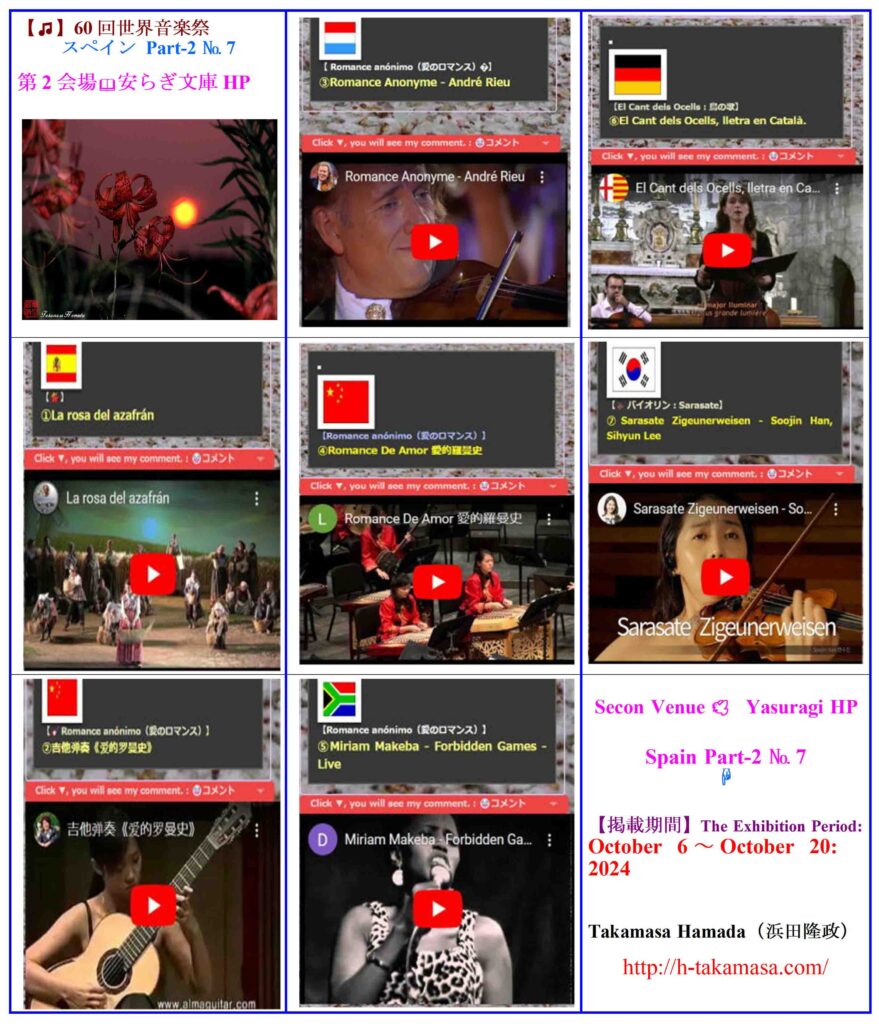🎵第60回世界音楽祭・🇪🇸Spain―第二部(Part 2)-№7
■
【第二会場】(安らぎ文庫HP)
☆☆☆☆☆
(2024/10/05)明日10/6🎵世界音楽祭・🇪🇸スペイン№7の中心曲と芸術について。
「Romance anónimo」(愛のロマンス)または「Forbidden game」(禁じられた遊び)はとても美しい曲です。
この曲はシンプルなため、 演奏者の多くがオリジナリティを出すのに苦労します。
もっとも、「単純」であることは芸術性を高めます。
この曲にどう対応するか、明日の「世界の歌」で幾つかの試みを紹介します。
☟
{Oct-5-①
“Romance anónimo” is a beautiful song.
Because of its simplicity, many performers struggle to create something original.
However, simplicity enhances the art.
In tomorrow’s “World Song,” I’ll introduce some attempts to deal with this song.
https://www.facebook.com/100002435359425/videos/983296799606762/
■
なお、スペインでみつけた掘り出し物(🎸演奏家)・#PaolaHermosín のこの曲(下記ではない別の演奏)の箇所には次のコメントを書いた。
☟
「禁じられた遊び」「愛のロマンス」は大変美しい曲。
しかし、演奏家はこの曲の表現で苦労することが多い。
理由は下記参照
https://x.com/yasuragitaka1/status/1842533256954298835
明日の「🎵第60回世界音楽祭・🇪🇸―Part 2-№7」で同処理するかお楽しみに。
#PaolaHermosín 明日は登場しないが、🇪🇸期間中再登場予定
また下記・演奏者🚺 #Whittingham も明日は登場しないが、🇪🇸期間中に登場する可能性が高い。
▼
この曲をどう演出するかが明日(2024/10/06)の課題である。
明日の世界音楽祭・スペイン№7で回答の一部を出す予定である。
是非ご覧を。(単純なものは芸術を高める。サイレント映画然り。#チャップリン 然り…となる)
☟
https://www.facebook.com/takamasa.hamada.92/posts/pfbid02WMuy3wQb8mBsRe9sBr2nrMDdRYgf6vEvrWx5VKEEJpJeuh3Eovo8VqK3ikWhF7hAl
▽
中心曲α「#禁じられた遊び」orβ「#愛のロマンス」である。
この曲は綺麗な曲。
されども、大変シンプルなため、多くのギターリストがこの曲だけで勝負するのは難しい曲でもある。
どう処理するかが今回の課題。
尤も🤡は監督ではないため自分で作られぬ限界がある。
▽
尚、αとβの違いを他の曲で例えれば、αが「#コンドルは飛んで行く」であり、後者がペルーの名曲「花祭り三部作」とでもいえよう。
▼
【🤡画像付き解説】
▽Oct 6–①【🎼】The 60 th world song Festival:
🇪🇸 exhibition HP.📢Part 2 №7
▽
①🇪🇸(Spain)💃#LaRosaDelAzafrán
②🇨🇳 (China)🎸#愛的羅曼史
③🇳🇱 (Netherlands)🎻#AndréRieu
④🇨🇳(China)#胡曉 #謝坦
⑤🇿🇦 (SouthAfrica)#MiriamMakeba
⑥🇩🇪 (Germany)#UlrikeVanCotthem
⑦🇰🇷 (SouthKorea)🎻 #SoojinHan
☟
http://h-takamasa.com
▼
▼
【A:🎵掲載曲】
【💃】
①La rosa del azafrán
【🎸Romance anónimo(愛のロマンス)】
②吉他弹奏《爱的罗曼史》
【 Romance anónimo(愛のロマンス)】
③Romance Anonyme – André Rieu
【Romance anónimo(愛のロマンス)】
④Romance De Amor 愛的羅曼史
【Romance anónimo(愛のロマンス)】
⑤Miriam Makeba – Forbidden Games – Live
【El Cant dels Ocells:鳥の歌】
⑥El Cant dels Ocells, lletra en Català.
【🎻バイオリン:Sarasate】
⑦Sarasate Zigeunerweisen – Soojin Han, Sihyun Lee
▽
なお、過去の解説集リンク集は下記ページで。
▼
▼
【B:🤡浜田隆政コメント】
【当面予定】全体の予定
7/14 :Part-1:№1:🎊 Opening.
7/28 : Part-1: №2:💃Spain
― 楽しく行こう
8/11 : Part-1: №3:🌐特別編
:ロマ族とスペイン
8/25 : Part-1: №4: 🥇一部(Part-1)最終回
9/08 : Part-2: №5🎊第2部開始ーClassic型
9/22 : Part-2: №6🎊第2部開始ーClassic型:楽器中心
10/6 Part 2 №7 classic 愛のロマンス中心
Part 3(第三部)
10/20:Part3 № 8 Spain 情熱編-1
11/03:Part3 № 9 Spain 情熱編-2
11/17:Part3 №10 Spain 正式編Final
▽
Part 4:(第四部):№11~→付録編案:
12/01:№11→楽器・classic中心、
12/15:№12→鳥の歌・追憶中心、
🎄12/24?:臨時🎅・世界のCHRISTMAS特集
2025/01/12:№13→ロマ族とスペイン
01/26:👑→Spain Grand Stage=Final予定
但し良いコンテンツが多数あれば延期もありえます
▼
①【🤡Comment】
スペインと言えば、ピカソ、ゴアなどを連想します。そこで、「世界音楽祭スペイン」第二部の最終回は芸術性が高いコンテンツの特集です。
中心は「愛のロマンス」・「禁じられた遊び」においています。
José María Moreno (ホセ・マリア・モレノ)氏が監督をしたようです。
▽
次回からの第三部(Part 3)では、情熱(passion)が中心となります。
▼
【歌手・曲紹介】
曲と踊りは№5で紹介済みのため、解説は省略します。
▼
【🤡から🎦作製者&歌手へのコメント】
💐It was a wonderful song and performance. I wish the content was a little longer…
(🎌素晴らしい歌と舞台でした。もう少し長ければ更に良かったのですが…)
▽
🏆The sixtieth world song ・Spain:Part 2-№7
September 22~to October 6:[2024]:📖❷Second Venue①
▼
▼
②【🤡コメント】
今回№7の中心曲は「愛のロマンス」「禁じられた遊び」です。下記のようなコメントをSNSに掲載しました。
▽
(2024/10/04)「Romance anónimo」または「Forbidden game」はとても美しい曲です。この曲はシンプルなため、 演奏者の多くがオリジナリティを出すのに苦労します。
もっとも、「単純」であることは芸術性を高めます。
この曲にどう対応するか、明日の「世界の歌」で幾つかの試みを紹介します。
{Oct-5-①
“Romance anónimo” is a beautiful song.
Because of its simplicity, many performers struggle to create something original.
However, simplicity enhances the art.
In tomorrow’s “World Song,” I’ll introduce some attempts to deal with this song.
▽
https://www.youtube.com/watch?v=Qk2Ow4ew8ws}
☟
この曲をどう演出するか。
②③④⑤でその回答をだします。なお、⑦番はサラサーテ関連のバイオリンですが、やはり演出として②~⑤と一組となっています。
▽
②番はα映画「禁じられた遊び」と共にナルシソ・イエペスとするか、β演出抜きで正面からこの曲にいどんだ全く無名のギタリストとするか迷い中です。
ただし、後者も音響には大変拘(こだわ)っています。
▽
中心曲α「#禁じられた遊び」orβ「#愛のロマンス」です。
この曲は綺麗な曲です。
されども、大変シンプルなため、多くのギターリストがこの曲だけで勝負するのは難しい曲です。
どう処理するかが今回の課題。
尤も🤡は監督ではないため自分で作られぬ限界があります。
▽
尚、αとβの違いを他の曲で例えれば、αが「#コンドルは飛んで行く」であり、後者がペルーの名曲「花祭り三部作」とでもいえます。
(2024/10/06 10:48)現時点での迷いは、ナルシソイエペスと映画「禁じられた遊び」のコンネーションでいくか、中国の無名の演奏家の「愛のロマンス」でいくか、です。後者は音響もこだわりがありました。
ここは、掲載の趣旨から行きますと、ナルシソイエペスと映画「禁じられた遊び」ですが、新鮮味を出すということと、「禁じられた遊び」と「愛のロマンス」の比較をするためにも、後者とします。
▽
「コンドルは飛んでいく」ではなく「花祭り三部作」が正式なのと同様です。サイモン&ガーファンクルの歌ではなく、ペルー界隈の歌なのです。
「禁じられた遊び」も同様に、作曲家については諸説がありますが、スペインに長く根付いていた歌のはずです。
今回掲載のものが、正式な「愛のロマンス」です。
世界の歌は各種偏見の打破、無名の歌手・演奏家・曲の掘り出しも念頭においております。同時に「世界の歌」でもあります。
▼
最後に愚痴。
私は音楽などは本来はほとんど知りませんし、本当は余り興味がないのです。私は(政治家とは全く違いますが)政治学者なのです。実際に教え子の一人が日本政治学会会長となったこともあります。
英語の教師等ではなく、社会科(政治経済・現代社会)の教師なのと同様です。
正に🤷(お手上げ)。
▽
駿台の🚺(女性ドタバタ劇)の件はそれ以上に無茶苦茶。一言で言えば、私は本来無関係であり全く興味もありません。催眠で操り…も限度が過ぎます。本来は全く無縁の歌以上に無茶苦茶でした。
▼
ともかく、これが本当の「愛のロマンス」です(「禁じられた遊び」ではありません)。「コンドルは飛んでいく」も本当は違っていますよ。
▼
【歌手の解説】
【演奏者】不明
▽
【曲】
「愛のロマンス」(あいのロマンス)は、ギターの楽曲。題名は「Romance anónimo(名前のないロマンス)」、「Estudio en Mi de Rubira(ルビーラによるホ調練習曲)」、「Romance de España(ロマンス・デ・エスパーニャ)」など多数の表記が見られる。
▽
起源についてはスペインの民謡とされることが多いが、19世紀後半にギターの練習用として作られたものと考えられており[1]、実際にクラシック・ギターの練習曲の定番として広く演奏されている。
作曲者についても諸説あるが、スペインのギター奏者アントニオ・ルビーラとする説が有力とされている。最初に映画で使われたのは1941年に製作されたアメリカ映画『血と砂』であるが、1952年のフランス映画『禁じられた遊び』の主題曲としてギタリストのナルシソ・イエペスが編曲・演奏したことで世界的に知られるようになった[2]。
▼
【🤡から🎦作製者&歌手へのコメント】
🎸👏Her performance is wonderful, and so are acoustics. If anyone knows her name, please let me know.
💐I will introduce her to Japan and the world on my websites.
(🎌彼女の演奏も、音響も素晴らしかったです。誰か演奏者の名前をご存知ならば教えてください。私のHPからも日本及び世界に紹介します。)
▽
🏆The sixtieth world song ・Spain:Part 2-№7
September 22~to October 6:[2024]:📖❷Second Venue②
▼
▼
③【🤡Comment】
(愛のロマンスへの対峙)
最初は世界の歌常連・André Rieuです。
彼のアイデアにはいつも敬服しています。
その上、あれだけ、演出にこだわり、頭を悩ませているにも拘(かか)わらず、髪の毛が豊富なのは正に驚異です。羨ましい限りです。悲惨な🤡ME。
▽
彼は、楽器と人間の声との融合を図りました。
▼
【歌手紹介(演奏家)】
André Rieu→何度も紹介済みのため省略。
▼
【🤡から🎦作製者&歌手へのコメント】
👏Mr. André Rieu, where do your ideas come from?
Tell me your secret. Just between you and me. Please, please, please.🙏
▽
André Rieuさんのアイデアはどこから生まれるのでしょうか。秘密にしますから、そっと私にその秘訣を教えてください。おねがい。
▽
🏆The sixtieth world song ・Spain:Part 2-№7
September 22~to October 6:[2024]:📖❷Second Venue③
▼
▼
④【🤡Comment】
(愛のロマンスへの対峙―2)
ここは、🎸ギターを離れて、この曲の新鮮味をだしたコンテンツです。
候補は二つあります。
Ⓐ一つは世界的に名声のあるグループです。
Ⓑもう一つは全く無名のグループです。
▽
演奏の質はⒶが高いです。(マイナス点は一切ありません)
だが、アイデアはⒷもかなりあります。(少し気になる所はあります。)
この二つで迷っています。
ただ、Ⓐの演奏家の表情がこの曲とマッチしていないため、Ⓑに傾きつつあります。Ⓑは一部の人が聞けば演奏で少し何かを感じるかもしれません。しかし、アイデアは良いです。
私は芸術はアイデア、即ち、頭で作るものと考えています。
▽
同時に、世界で無名の人を発掘するのが「世界の歌」の使命の一つでもあります。そこからもⒷに傾きつつあります。
結論は起床後となります。
▽
ここは他の楽器との組み合わせ編です。
ポールモーニアなども演奏していましたが、候補曲は二コンテンツで迷っています。
Ⓐ一つはHAUSER(クロアチア)の演奏版です。
Ⓑもう一つは中国の多分学生などの琵琶?や木琴を使った演奏です。指揮は「謝坦」氏です。編曲は「胡曉」氏です。
▽
Ⓑはアイデア(発想)は大変よいのですが、演奏の質が少し気になるのと、世界の歌・スペインで一度使用していることです。
Ⓐは演奏の質は問題ないのですが、演奏のときの表情がこの歌とマッチしていないような気がすることです。
▽
漏れた方は第四部(Part-4)で紹介します。
暫くお待ちください。②番を先に検討しますが、②番も迷っています
▼
音楽(演奏)の質で言えばHAUSER(ハウザー)ですし、視聴者の受けも当然同様ですが、異端児・🤡MEは敢えて、チャレンジを重視した・無名のバンドの方を掲載します。
▽
なお、異端児・🤡MEは本来政治とは無縁でした。ところが、我が友、ミスター・オバマのジョークに釣られて…オバマ、トランプ、バイデン…と😭、猫も😿(泣く)。日本ではニャーオンと泣く(鳴く)。
▽
ミスターバイデンが大統領になったときにも何度も言いました。「海外の友とは政治と宗教の話はタブーである」と。ただし、二つのみ例外としていました。
一つは、国連にとって替わる、誰にとっても必要な(強力な世界統一軍を持つ)世界連邦政府樹立、次に、人類の戦いは「病との戦い」である、と。
国を守るとは土地ではなく、人間であり、最大の課題は病との戦いであることを主張することでした。それ以外は😷…🤐としたいが、🤡の願望でした。
▽
ともかく、異端児・MEはチャレンジが好きですので、多少気になる箇所があってもチャレンジを重視して、こちらとします。
Hausserの演奏は第四部(Part 4)で紹介します。
Miserable(ミゼラブル)・MEより。
▼
【歌手・曲紹介】
現時点では不明。
▼
【🤡から🎦作製者&歌手へのコメント】
💐The performance was wonderful, but the ideas and arrangements were also wonderful.
👏I was reminded that art is created by the human brain.
(🎌演奏も素晴らしいが、アイデア及びアレンジも素晴らしい。
芸術は人間の脳が作るものであると、私は再認識しました。)
▽
🏆The sixtieth world song ・Spain:Part 2-№7
September 22~to October 6:[2024]:📖❷Second Venue④
▼
▼
⑤【🤡Comment】
(愛のロマンスへの対峙―3)
ここは既に、何度も使用したコンテンツですが、ミリアム・マケバ(Miriam Makeba、1932年3月4日 – 2008年11月10日)とします。
彼女は南アフリカ共和国出身ですが、1967年に反アパルトヘイト活動で、国外追放され、🗽アメリカに行きます。
▽
その頃は公民権法は成立しており、ジムクロウズロウズ( Jim Crow laws)もなくなりつつあったとはいえ、アメリカでは今以上の差別が残っていました。
「自由の国」・アメリカに行っても、彼女はいろいろと考えることがあったでしょう。
▽
彼女の歌手としての能力のみならず、そうした生き様が、この歌「禁じられた遊び」を人の心にしみこむ作品にしたようです。
▽
なお、彼女はかなり老いた後でも、この歌を歌っています。しかし、演出の仕方はかえています。
その内容を総合案内所のスペイン特集①番で掲載しておきます。
(2024/10/06 9:53)彼女はこの曲に、かなり思い入れがあったようです。
そこで、彼女の晩年にも、この曲に新たな形でチャレンジしています。
晩年の彼女のパフォーマンスを総合案内所・第三会場で、約10分後に掲載します。
総合案内所(第三会場)
▽
なお、マキバがアメリカに来た頃の映像を見ましたが、20代の若き乙女でした。
希望の国・自由の女神・アメリカに希望を持ってきた姿が現れていました。
しかし、後に、その想いは…。
この経験が、彼女の「禁じられた遊び」には現れているように思えます。
彼女には、この歌への思い入れがあったのでしょう。
正に、この世は「禁じられた遊び」に思えたのでしょう。
アパルトヘイトの世界からJim crow lawsの世界へ…と。
▼
▼
【歌手紹介】
ミリアム・マケバ(Miriam Makeba、1932年3月4日 – 2008年11月10日)は、南アフリカ共和国の歌手でグラミー賞受賞者。「ママ・アフリカ」の名前でも知られている。
▼
【🤡から🎦作製者&歌手へのコメント】
▼
🗽It pains me to think of Miriam Makeba coming to America from South Africa. From the country of Apartheid to the United States when Segregation still exists.
☠This world is truly a “forbidden game.” 🕊This is reflected in her song.
▽
(🎌Miriam Makebaが南アフリカ共和国からアメリカに来たときを思うと、心が痛みます。ApartheidからSegregationの残存時代のアメリカへ。
正に、この世は「禁じられた遊び」です。それが歌にも反映されています。)
▽
🏆The sixtieth world song ・Spain:Part 2-№7
September 22~to October 6:[2024]:📖❷Second Venue⑤
▽
▼
⑥【🤡Comment】
ここは、第二部の中心曲・鳥の歌となります。
世界の歌・スペインで使用したコンテンツですが、再度使用します。
▼
【歌手・踊り手紹介】
Ulrike Van Cotthem
ドイツのメレに生まれたウルリケ・ヴァン・コッセムは、フライブルク・イム・ブライスガウ国立音楽学校(ドイツ、フライブルクの高等音楽学校)で音楽の勉強を始め、そこで歌、ピアノ、ダンス、演劇など幅広い音楽訓練を受けました。ゲルト・ハインツ) と合唱とオーケストラの指揮。彼女は教育訓練も受けています。そこで彼女は、歌とピアノを主な科目として音楽教師としての国家資格を取得しました。同時に、彼女はアルベルト・ルートヴィヒ大学フライブルク・イム・ブライスガウでラテン語を学び、そこで国家卒業証書も取得しました。(彼女のHP自動翻訳)
https://www.ulrike-van-cotthem.com/parcours
▼
【🤡から🎦作製者&歌手へのコメント】
Her singing was wonderful, and the musicians playing in the background were in perfect sync. I think the singer is “Ulrike Van Cotthem”, but please let me know if I’m wrong.
(🎌歌も素晴らしいですが、演奏者との息もよく合っていました。歌手は「Ulrike Van Cotthem」さんと思いますが、違っていれば教えてください。)
▽
🏆The sixtieth world song ・Spain:Part 2-№7
September 22~to October 6:[2024]:📖❷Second Venue⑥
▼
▼
⑦【🤡Comment】
【芸術との対峙―音楽演奏と表情】
最後は、Zigeunerweisenです。
2コンテンツで迷っています。
一つはウクライナと思いますが、素晴らしい演奏です。
もう一つは、バイオリンのオーソドックスなものです。
現時点では後者に傾いています。
理由は、顔の表情です。彼女は、バイオリンの演出をしながらも、顔でも音楽の流れを演出していました。もし、後者を掲載したならば顔の表情に注目をしてください
▼
【歌手/曲紹介】
1986年に韓国で生まれたハン・スジンは、2歳の時にイギリスに移住しました。8歳でバイオリンを始め、ユーディ・メニューイン音楽院に入学し、その後パーセル音楽院に転校してフェリックス・アンドリエフスキーに師事しました。その後、オックスフォード大学とロンドン王立音楽院で学び続けました。
https://www.kronbergacademy.de/en/
person/soojin-han
▼
【🤡から🎦作製者&歌手へのコメント】
💐It was a wonderful performance. She had great energy. 🎻In addition, I felt that it was also important that she was able to become one with Zigeunerweisen.
There are many good singers and performers in Korea. Many of them are not well known in the world. What a waste! It’s a shame.
(🎌素晴らしい演奏でした。彼女の気力もありました。それに付け加えて、Zigeunerweisenと一体になれたことも大きかったように私には思えました。
韓国には良い歌手・演奏家が多くいます。世界で知られていない歌手・演奏家も大勢います。もったいない話です。)
▽
🏆The sixtieth world song ・Spain:Part 2-№7
September 22~to October 6:[2024]:📖❷Second Venue⑦
■
■
【第二会場】は第5回世界の歌・アイルランド参照
■
■
【第三会場】は第5回・Ireland参照と共有
臨時会場のため、掲載とき(掲載時は毎回10日前後となる)に遅れて、内容を添付
■








